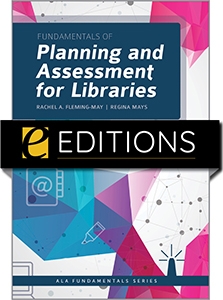
Primary tabs
You don't need to be an ALA Member to purchase from the ALA Store, but you'll be asked to create an online account/profile during the checkout to proceed. This Web Account is for both Members and non-Members. Note that your ALA Member discount will be applied at the final step of the checkout process.
If you are Tax-Exempt, please verify that your account is currently set up as exempt before placing your order, as our new fulfillment center will need current documentation. Learn how to verify here.
- Description
- Table of Contents
- About the authors
- Reviews
Melding theory with practice to make abstract concepts practical, this foundational book is the perfect tool for understanding the basic principles of planning and assessment, no matter your experience level.
The concepts of planning and assessment are intrinsically linked—and understanding them is essential for raising the library’s profile and strengthening its position among stakeholders and the community. Even if you're an LIS student or are new to the profession, or if planning or assessment are not your primary areas of responsibility, you still have a role to play in the success of organizational efforts. Fleming-May has more than a decade of experience in planning and assessment initiatives and instruction, and Mays was her institution’s first assessment librarian; their primer draws from theory, research, and their first-hand observations to illuminate such topics as
- characteristics of bad planning strategy that can help to illustrate a better approach;
- reasons why using economic models, like ROI, fall short;
- how to mix the three types of planning;
- guidelines to ensure that assessment is meaningful and actionable;
- tips for creating effective surveys;
- emphasizing users’ needs with a critical assessment framework;
- data analysis for surveys, interviews, focus groups, and observation;
- four questions to ask about audience level before you develop a report;
- a sample 3-year assessment plan that can be customized; and
- seven steps for developing a culture of ongoing assessment.
Preface
1 Introduction to Planning and Assessment
2 History of Planning/Assessment
3 Fundamentals of planning
4 Basic principles of assessment
5 Approaches to assessment
6 Collecting data: Principles
7 Collecting Direct Evidence
8 Collecting Indirect Evidence
9 Analyzing Data
10 Reporting and Presenting Data
11 Collaboration and Relationship Management
Appendix A Glossary of Terms
Appendix B Sample Library Assessment Plan
Appendix C Sample Informed Consent Form
Appendix D Sample Observation Template
Appendix E Continuing Education and Professional Development
Appendix F Assessment Librarian: Position Description Example
Rachel A. Fleming-May
Rachel A. Fleming-May is an Associate Professor in the School of Information Sciences at the University of Tennessee-Knoxville. Prior to earning her Ph.D. from the University of Alabama in 2008, Fleming-May worked as a public and academic librarian for several years. Her teaching and research interests include academic libraries and librarianship, information sources and services, and library assessment. She has worked on two assessment-related Institute of Museum and Library Services (IMLS)-funded grant programs: Experience Assessment: Building User Experience and Assessment Capabilities in Libraries and Information Centers (UX-A) (co-Principal Investigator), and Value, Outcome, and Return on Investment of Academic Libraries (Lib-Value) (management team member).
Regina Mays
Regina Mays is an Associate Professor and Head of Assessment Programs and Collection Strategy at the University of Tennessee-Knoxville Libraries, where she has practiced, researched, and published on library assessment and planning for over a decade. She holds an MSIS from the University of Tennessee Knoxville. Her research interests include library assessment and planning, with a particular focus on the organizational structure of assessment in academic libraries, mentoring and assessment education for library professionals, strategic planning, and demonstrating library value.
"The authors use real-life anecdotes and hypothetical examples and offer figures that supplement and illustrate concepts introduced. Five appendices provide additional useful resources—e.g., a sample assessment plan, an informed consent form, and a template for recording observations."
— Choice
"Written in the conversational tone of a trusted assessment mentor ... This realistic and pragmatic monograph may be read in its entirety for an overview or consulted a section or chapter at a time as needed, for instance, during strategic planning or when performing data analysis. The book’s utility is increased by the fact that it includes explanatory charts, resources for further reading at the end of each chapter, a brief glossary, and an extensive index. Those interested in both public and academic library assessment will find this a useful volume."
— Technical Services Quarterly
"Planning and assessment are no longer something libraries need to consider; they are essential to survival. Library schools need to make this part of all curricula. This book could and should be the textbook ... The bottom line of this book is growth and development of skills for survival. For the expert, this resource can become a teaching tool to bring staff on board to get involved with the process. It takes the scary out of the process and makes it a real part of the job. The Appendices are real tools for execution and instruction. "
— Journal of Hospital Librarianship


